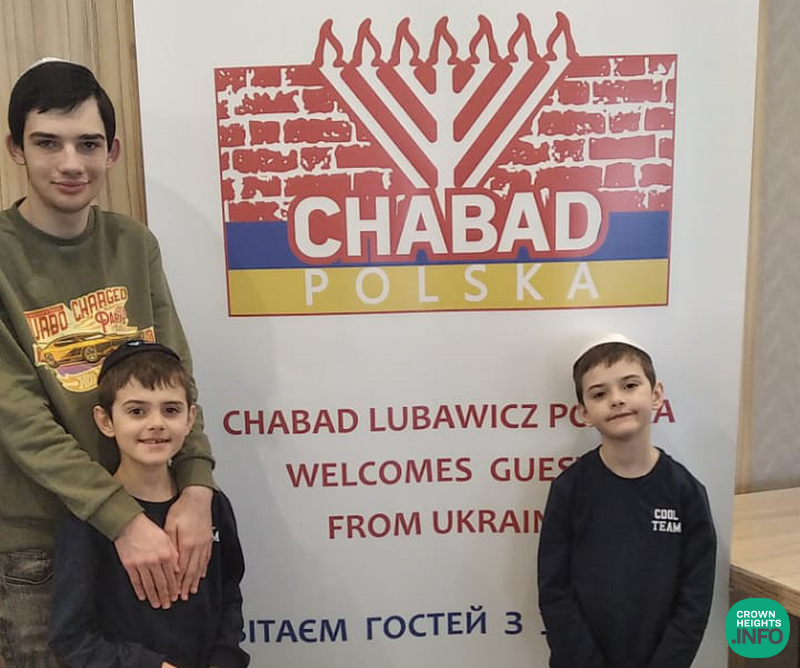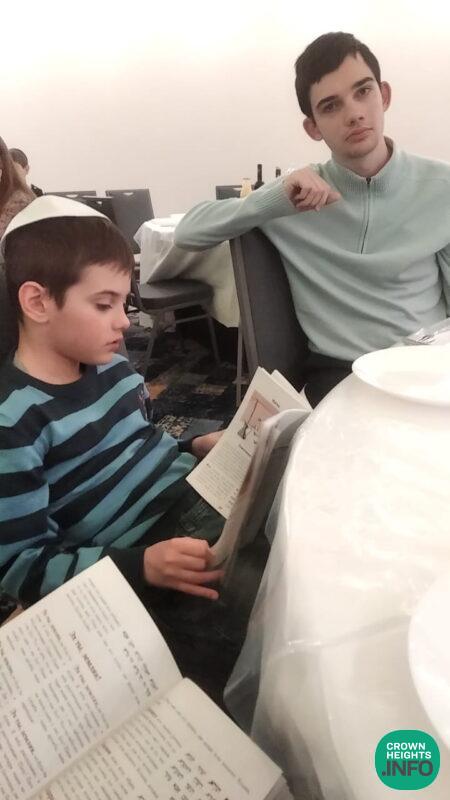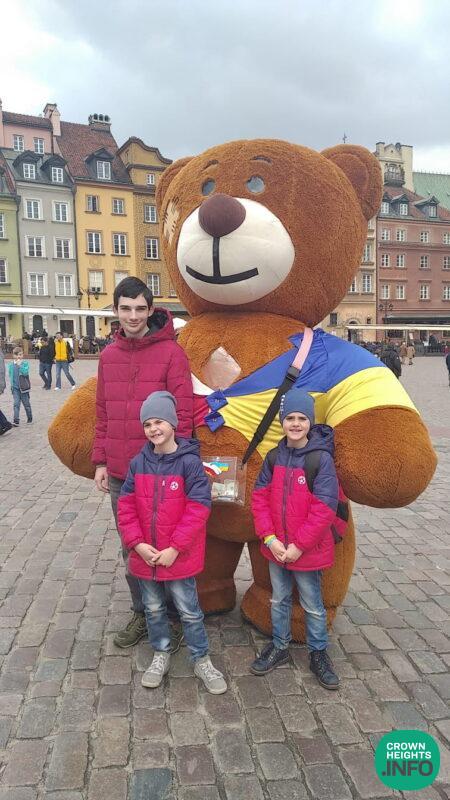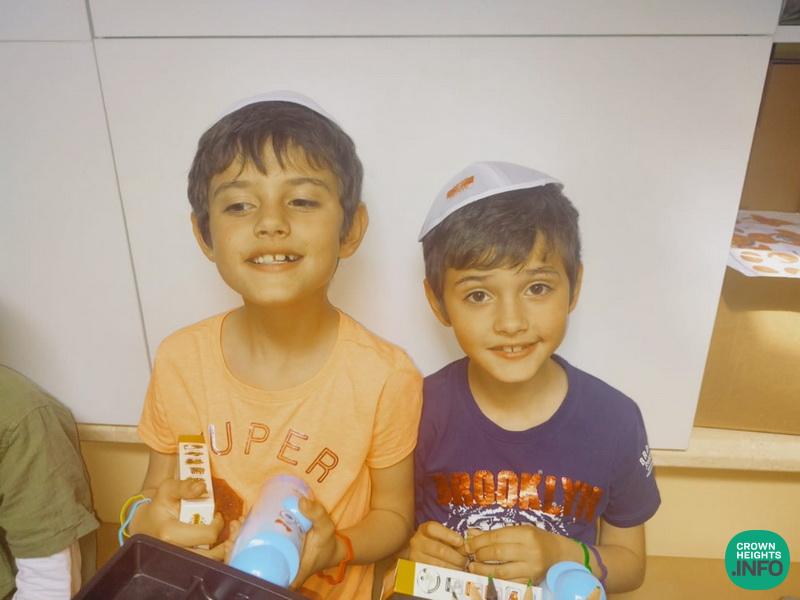
Mother and Three Children Turn To Chabad in Poland For Help After Fleeing Ukrainian War
Mariana Tsopa and her three children’s lives were upended on Feb. 24, 2022, when Russia launched a full-scale invasion of Ukraine.
Before this war started, the family’s daily routine for the Chernivtsi-based family resembled many busy working parents around the world.
“In the morning we would get up at 7:20, we would eat breakfast and then my older son would go to school. I would take my younger twin sons to kindergarten, and then I would have time to work,” she said. Mariana’s typical schedule before the war also involved leaving her fourth-floor walkup apartment to go to her office where she worked as an English translator. At the end of her workday, she would pick up her children from school and, on most days, accompanying her younger ones to speech therapy.
Mariana’s children include her now 16-year-old son Oleksander and now 8t-year-old autistic twin boys Daniil and Bohdan. Before the war, she would take her twins to speech therapy which was among the collection of regular services they received to address each boy’s range of adaptive challenges.
The family was also very involved in the Chabad of Chernivtsi, where in addition to attending prayer services, her children attended classes led by Rabbi Menachem Mendel Glitzenstein, almost every evening.
That all changed with the start of the war. The family’s quiet day-to-day routine became upended by rockets filling the sky, explosions on the ground, intermittent access to electricity and hours of waiting out the danger in bomb shelters. School and services for her children were no longer something that she could rely on, as the invasion’s wide range of externalities would often interfere. As classes transitioned to online, internet access and electricity became unreliable, and the days turned into months, it was very rare that Mariana’s children received a full day of education. For her twins for whom the regular routine, therapies and schooling were particularly important, this was most impactful.
“While classes went virtual, an alarm would sound that a rocket was coming,” Mariana recounted explaining her children’s class would be disrupted because the startling echo of the blaring siren throughout Chernivtsi meant that the whole neighborhood needed to run to the bomb shelter. “Classes would be disrupted because either the teacher or the students would lose electricity throughout the day.”
Compounding the families’ predicament further were the challenges posed by her younger children’s autism, predisposing them to have heightened reactions, making them uniquely vulnerable to constant alarms, explosions and disruptions in schedule. Her children’s new perpetual state of fear complicated by a lack of continuity in their reception of specialized services agitated them and prompted their erratic and unpredictable behaviors.
As the family would huddle under multiple blankets in their dark heatless apartment as the winter weeks progressed the only support that the family could rely on for some semblance of normalcy remained their local synagogue. “Chabad had installed a generator, so I would bring the kids there to escape from the cold for a few hours, charge our devices and participate in their communal programs along with the other families in the neighborhood.”
The desperately needed Chabad lifeline was extended further when its affiliate, Chabad of Poland in Warsaw, offered welcomed relief, inviting 250 members of the community to briefly escape the chaos by joining them for a two-week respite during the Passover holiday in 2023.
Nearly 14 months after Russia invaded her home and a 10-hour bus ride out of Ukraine, Mariana and her boys began the holiday which she would later describe as “the best of her life,” not only because of the spiritual reprieve it provided but also the hospitable escape and security the family so badly desired. After checking into the nearby hotel, Mariana said their initial reaction was that “we were happy that there was electricity, and it was warm. There were no sirens going on and it was safe. It was very relaxing.”
For 14 days, Mariana and her children were treated like royalty, helping them to almost forget the stress of the last year and the war tearing their homeland apart. Along with 250 other Ukrainian Jews fleeing the war, they came together to break Matzah, relax, pray and enjoy holiday programming. The two-week hiatus from the war included festive meals and Torah classes, the traditional Passover seders and special Chol Hamoed excursions, including one to a trampoline park that nearly four months later her children are still talking about.
The holiday retreat was part of a larger initiative by Chabad of Poland to provide ongoing financial, emotional and religious support to the Jewish community of Ukraine during this challenging period. The Warsaw-based group has not only been a consistent source of spiritual refuge for Jews from Ukraine but has also helped many resettle in Poland, Western Europe and Israel, through the tireless efforts of Chabad of Poland’s director, Rabbi Sholom Ber Stambler and his dedicated wife, Rebbetzin Dina who invest their every moment in towards providing for the needs of each individual refugee.
Rabbi Mayer Stambler, Rabbi Shalom Ber’s brother and the co-director of Chabad of Poland, works to mobilize resources from abroad to help fund these incredible programs. More than 3,000 donors from across the globe helped to fund the holiday experience Mariana and her children were able to enjoy.
Now, even though Mariana and her boys have returned to Chernivtsi, they reminisce about their time away from the constant violence and long to return to the respite it provided. It has been several months since the Passover program ended. “They keep asking when we will go again,” Mariana said.
Since the start of the Russian incursion into Ukraine, Chabad of Poland has opened its doors to Ukraine’s Jewish community offering refuge, transportation, kosher food, medical aid, financial and material assistance, childcare, educational and social services, communal activities, and administrative and legal aid to tens of thousands displaced by the conflict. Since the start of the war, Chabad in Poland has seen its expenses rise by more than US$2 million. For more information or to contribute to relief efforts, please visit: www.saveajew.org.















